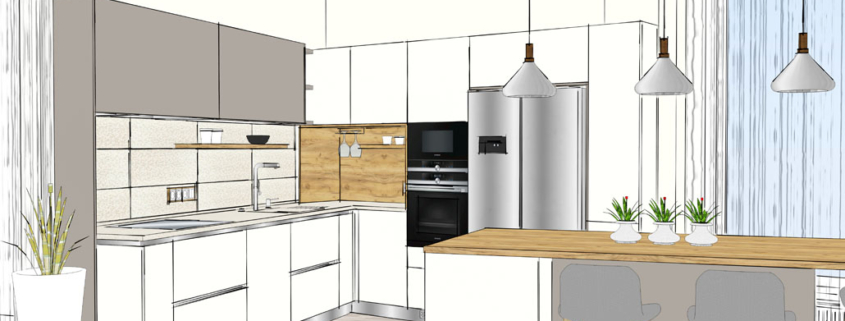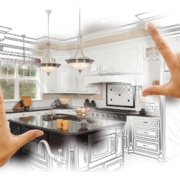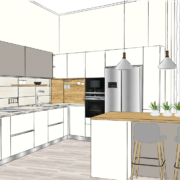Eco-Friendly Kitchen Remodeling Materials for 2025
The kitchen has always been the heart of the home, but in 2025, it’s also the hub of sustainable living. Homeowners are more conscious than ever about the environmental impact of their choices, and kitchen design is at the forefront of this movement. Choosing eco-friendly kitchen remodeling materials not only reduces your carbon footprint, it also creates a healthier space for your family while adding long-term value to your property.
As an experienced interior contractor, Nest Inc. has seen firsthand how sustainable materials are reshaping the way kitchens are designed and built. From recycled countertops to responsibly sourced cabinetry, the options are both stylish and environmentally responsible. If you’re planning a remodel this year, here’s what you need to know about the best sustainable kitchen renovation materials available in 2025.
Why Eco-Friendly Remodeling Matters
A kitchen remodel is a major investment, and every decision you make. What you put on the walls, floors, or counters has an impact. Traditional materials often involve toxic chemicals, high energy use during production, and wasteful manufacturing processes. Eco-friendly alternatives, on the other hand, are designed with durability, renewable resources, and minimal environmental harm in mind.
By focusing on eco-friendly kitchen remodeling, homeowners don’t have to sacrifice aesthetics or performance. In fact, many of today’s green materials are more durable and easier to maintain than their conventional counterparts. Plus, buyers are increasingly drawn to homes with sustainable features, making eco-conscious upgrades a smart investment in the future.
Cabinetry: Where Sustainability Begins
Cabinets often set the tone for the entire kitchen, and they also take up the most space. That makes them one of the most important areas to consider when selecting sustainable kitchen renovation materials.
In 2025, many manufacturers are prioritizing responsibly sourced wood certified by organizations like the Forest Stewardship Council (FSC). These cabinets are built from timber harvested in ways that protect ecosystems and promote long-term forest health. For an even greener option, some homeowners are turning to bamboo, which grows quickly and regenerates without replanting.
Another consideration is how cabinets are finished. Low-VOC (volatile organic compound) stains and paints are now widely available, reducing the release of harmful fumes into your home. Pairing renewable materials with healthy finishes creates cabinetry that looks beautiful while aligning with eco-friendly goals.
Countertops: Recycled and Renewable Options
Countertops are one of the most visible and heavily used surfaces in the kitchen, which makes material choice critical. Fortunately, there are more eco-conscious options than ever in 2025.
Recycled glass countertops remain a popular choice, offering vibrant colors and unique patterns created from post-consumer glass embedded in durable resin or cement. Recycled paper composite counters have also grown in popularity; they’re sleek, modern, and surprisingly strong, all while diverting waste from landfills.
For those who want a natural material, quartz continues to be a favorite, especially when sourced from manufacturers with strong sustainability practices. Some companies now incorporate recycled quartz in their slabs, reducing reliance on new mining. Another timeless option is reclaimed wood, which adds warmth and character while reducing demand for newly harvested lumber.
Flooring: Built for Longevity and Sustainability
Kitchen floors take a lot of abuse, from heavy foot traffic to spills and dropped utensils. Choosing sustainable flooring doesn’t mean sacrificing durability.
Cork flooring, made from the bark of cork oak trees, is renewable and naturally antimicrobial, making it ideal for kitchens. Bamboo flooring remains another top choice, offering strength similar to hardwood with a much faster regrowth cycle. Reclaimed hardwood, salvaged from old barns or industrial buildings, brings history and charm into the kitchen while keeping usable material out of landfills.
For a more contemporary look, many homeowners are choosing eco-friendly tiles made from recycled ceramic or porcelain. These tiles are long-lasting, easy to clean, and available in endless styles that suit any design aesthetic.
Appliances and Fixtures: Efficiency Matters
A sustainable kitchen remodel goes beyond surfaces; it also includes the appliances and fixtures that drive daily function. Energy-efficient appliances certified by ENERGY STAR are standard in 2025, reducing both environmental impact and monthly utility bills.
Water-saving fixtures are another essential part of eco-friendly kitchen remodeling. Faucets with aerators and low-flow technology cut down on water waste without sacrificing performance. Combined with smart technology, such as dishwashers that sense load size and adjust accordingly, these choices make kitchens more efficient and environmentally responsible.
Paints, Adhesives, and Finishes
Many homeowners overlook the hidden chemicals in paints, adhesives, and finishes. Traditional products often contain VOCs, which contribute to indoor air pollution and can negatively impact health. Fortunately, there’s been a huge shift toward low- or zero-VOC options in 2025.
Eco-friendly paints are available in a wide variety of colors and finishes, so homeowners don’t have to compromise on design. Natural adhesives derived from soy or plant-based resins are also replacing petroleum-based glues in many applications. Choosing these healthier finishes creates a safer kitchen environment and contributes to overall sustainability.
Lighting: Designing With Efficiency in Mind
Lighting is another area where small choices make a big impact. LED technology has advanced significantly, offering warm, natural-looking light with a fraction of the energy use of traditional bulbs. Pairing LEDs with smart lighting systems allows homeowners to control brightness and timing, further conserving energy.
Natural lighting also plays a role in sustainable design. Larger windows, skylights, and even reflective surfaces help maximize daylight, reducing reliance on artificial light during the day. An interior contractor can help balance design and placement so that light is used efficiently without compromising privacy or comfort.
The Role of an Interior Contractor
Managing a sustainable remodel requires more than just choosing the right materials. An experienced interior contractor ensures that eco-friendly products are installed correctly, sourced responsibly, and integrated seamlessly into the overall design. They also help homeowners balance budget with sustainability goals, suggesting where premium investments like reclaimed wood or recycled countertops will have the biggest impact.
In addition, a contractor ensures compliance with building codes, coordinates with suppliers, and manages the logistics of working in urban environments like New York City. With the right team, homeowners can feel confident that their remodel not only looks great but also aligns with the highest sustainability standards.
The Future of Eco-Friendly Kitchens
The trend toward sustainability is only accelerating. As manufacturing processes become greener and technology continues to improve, eco-friendly materials are becoming more accessible and affordable. What was once considered a luxury, like recycled countertops or bamboo cabinetry, is now mainstream, and new innovations are appearing each year.
In 2025, eco-friendly kitchen remodeling is less about making compromises and more about making smarter choices. Homeowners no longer have to choose between design, durability, and environmental responsibility. With today’s sustainable kitchen renovation materials, it’s possible to have all three.
Your kitchen should be a reflection of your values as much as your style. By choosing eco-conscious materials and working with an experienced interior contractor, you can create a space that’s beautiful, functional, and environmentally responsible. From cabinetry and countertops to appliances and lighting, every choice you make brings you closer to a healthier home and a greener planet.
Ready to Build Your Sustainable Kitchen?
At Nest Inc., we specialize in designing and building kitchens that combine modern design with sustainable kitchen renovation materials. Our team will help you select eco-friendly options that fit your vision, your budget, and your lifestyle. Request your free quote today.







